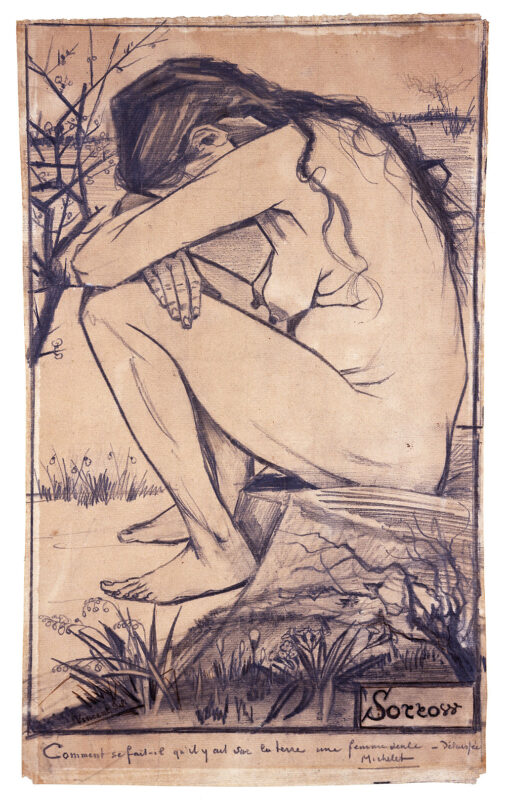
Sorrow, a Van Gogh drawing of a pregnant Sien Hoornik
Selling only one painting during his lifetime, Vincent Van Gogh has become the archetype of the tortured genius not appreciated until after his death. His long-running mental health problems have been the subject of movies and ballads (with one moving example being Don McLean and later Josh Groban’s Vincent). There’s something about the narrative that tickles at our Jungian senses. Somebody who is dealt a bad hand all throughout their life has a deus ex machina glory thrust upon them, sort of a posthumous version of the classic folklore motif of the peasant who finds out that they’re royalty.
Much less well known is Van Gogh’s muse during his time in The Hague whose life paralleled his in some ways. Sien Hoornik was a single mother prostitute born into abject poverty who gave birth to four children (two of whom died), and who was wracked by venereal diseases throughout her life. Van Gogh took her and her children in while she worked for him as a model in what some consider to be his only romantic relationship. They considered marriage, but due to pressure from Van Gogh’s family about marrying beneath his social status he eventually turned her out, after which time she probably went back to working as a prostitute to feed her family. She took her own life about twenty years later.
Now that she belongs to the eternities I doubt she cares, but some part of me wonders if she gains some solace from the fact that, while during life she sold her body to feed her children, after death drawings of her are worth many fortunes. While Van Gogh is the paradigmatic example of a kind of posthumous, this-worldly recompense for a hard life, for every Sien Hoornik there are millions of people like her who, as George Elliot put it “lived faithfully a hidden life, and rest in unvisited tombs.”
Of course, complete recompense for life’s pain will typically only occur in the hereafter, where in a sense the folk motif of the peasant discovering their royal heritage becomes sublimely real. No my dear, you are not a prostitute, beggar, peasant, prince, or even an emperor; you are a God. (Potentially).
The thought isn’t unique to me, but I read somewhere I can’t recall that, of the thousands if not millions of slaves in the ancient world, we have the words and perspectives of only a handful, which isn’t surprising given that most ancient kings now only exist as a subscription or coin here or there (if that). The study of history can be depressing when you realize that it’s more or less reducible to the story of billions of people just trying to have a moment’s respite from heart-wrenching pain, loss, and fear, often by dealing severe pain, loss, and fear on others. It makes the cry, “is there no other way?” very understandable. .
One of my most-read scriptures is in Revelations; it comes to mind often when I read about or meet somebody like Sien Hoornik:
And God shall wipe away all tears from their eyes; and there shall be no more death, neither sorrow, nor crying, neither shall there be any more pain: for the former things are passed away. And he that sat upon the throne said, Behold, I make all things new.
(It was easy to miss, but this scripture is movingly referenced in The Passion of the Christ when Christ’s mother picks his body up after he falls while carrying the cross: “See mother, I make all things new.”)
Of course, as the Marxists correctly point out, there is a risk of other-worldy focused people being taken advantage of by this-worldly people. Sure, that’s a thing and we should be on our guard, but making everything new, of having everything wiped clean, if true, is worth a lifetime of false priests who oppress.

Comments
5 responses to “Sien Hoornik, Vincent Van Gogh, and Making All Things New”
If you’re keeping a list of your good posts vs. your great posts, this is one of the very best.
Thanks Jonathan
it is indeed a wonderful post, but only my mind and spirit can know this. Not my body. Poor dear Sien.
Thanks for this, Stephen. For some reason I’ve been feeling kind of gloomy about the future for the past week or so, and this was a good reminder that 1) even if some of our progress gets rolled back we’ll still be providing better lives for more people than during most of history, and 2) all of this world’s pain will be healed eventually.
Lol, what could have possibly happened in the past week to make you feel gloomy about the future?
But seriously, thank you.